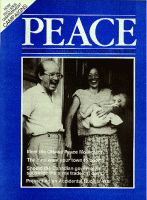
Peace Magazine Oct-Nov 1986, page 19. Some rights reserved.
Search for other articles by Dieter Heinrich here
A UNIQUE OPPORTUNITY EXISTS IN CANADA TO challenge Canadian foreign policy in the courts. Unlike the situation in the U.S. and Britain, where courts have held that they lack jurisdiction to review government decisions in foreign policy or defense, the Supreme Court of Canada has asserted its jurisdiction to hear cases of this nature.
This was perhaps the most important legacy of Operation Dismantle's efforts to win a court injunction to stop cruise missile tests. In that case, the Supreme Court of Canada ruled government decisions on foreign policy and defence must be consistent with Canada's new constitution and could be reviewed by the courts.
The Operation Dismantle decision has opened the door for others to try court actions. Now the World Federalists of Canada are launching the Nuclear Weapons Legal Action, a major legal initiative to seek a court declaration that nuclear weapons, their manufacture, possession, deployment and planned use are illegal. The Nuclear Weapons Legal Action is aiming to remove Canada from participation in nuclear strategies by having the courts declare them illegal.
TOGETHER WITH OTHER PLAINTIFFS, THE WORLD Federalists will file a case in the spring of 1987 in the Federal Court of Canada. The co-plaintiffs are expected eventually to number several dozen Canadian organizations representing a wide cross-section of Canadian society.
The Court will be asked to set aside certain agreements entered into by the Canadian government which allow nuclear weapons on Canadian territory in times of crisis, and in Canadian ports and territorial waters. A favorable decision by the court may result in Canada becoming the world's first judicially declared nuclear weapons free zone.
The case is also intended to provide a vehicle for public education on the nuclear issue. It will further de-legitimize nuclear weapons in the public mind, and give substance and credence to the reality of international law.
A NUMBER OF EMINENT CANADIAN LAWYERS have already offered their help. Members of the legal advisory board include former Saskatchewan Attorney-General Roy Romanow and international lawyer Dr. Edward McWhinney, a world authority on international law, who has offered to act as senior legal counsel for the case.
In Dr. McWhinney's view, "the time is ripe for raising the issue of the legality of nuclear weapons and their testing and deployment in times of peace." While the legality of nuclear weapons received little attention in the post-war years, a climate now exists to argue the case for the relevance of international law in this field. He expects the great shift in the public consensus against nuclear weapons to be a strong influence on the Court's decision.
A great deal of preliminary legal work on the case has been done by Vancouver lawyer Bruce Torrie, whose discussion paper "Beyond the Operation Dismantle Decision" has been in circulation for more than a year. The paper advances four grounds for declaring nuclear weapons illegal:
The initial approach will be to attempt to enjoin the government in "cooperative litigation" rather than assume a confrontational stance from the outset. The plaintiffs will appeal to the government to treat this case as a subject of wide public interest which should be adjudicated dispassionately. The benefits of cooperation, if it can be achieved, would be substantial in lowered costs, a faster decision and reduced polarization leading perhaps to improved outreach to major conservative sectors of society which still remain outside the peace movement.
WFC is now seeking endorsers and co-plaintiffs, as well as organizational help and funds. Interested organizations and individuals should contact:
Nuclear Weapons Legal Action, World Federalists of Canada
46 Elgin St., Ste. 32 Ottawa K1P 5K6.

Peace Magazine Oct-Nov 1986, page 19. Some rights reserved.
Search for other articles by Dieter Heinrich here